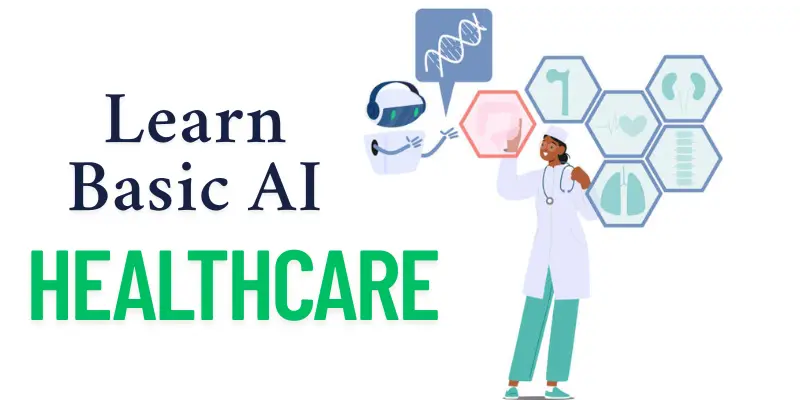How to Boost Your Career in Healthcare AI: A Step-by-Step Guide
Published: 3 May 2025
Want to build a strong career in Healthcare AI? You are in the right place.
Healthcare is changing fast. AI is now helping doctors, hospitals and even patients in amazing ways. From detecting diseases early to saving time with smart tools, AI is making healthcare better with every coming day.
Because of this, the demand for people who understand both healthcare and AI is growing fast. Whether you are a student, a nurse, a software developer or just curious, there’s a place for you in this field.
In this guide, you will learn step by step how to start or grow your career in Healthcare AI. I am going to keep things simple, beginner-friendly and easy to follow—even if you don’t have a tech or medical background. Let’s get started!

What Is Healthcare AI?
Healthcare AI means using smart computer tools to help in health and medicine. These tools can think, learn and make decisions just like humans but faster. They look at health data, find patterns and suggest what to do next.
You don’t need to be a tech expert to understand it. Think of it like this: AI in healthcare is just smart help for health problems.
How Is It Used in Healthcare?
AI is already working in many places. Here are some easy examples:
- Detecting diseases early: AI looks at X-rays and spots things that doctors might miss.
- Helping patients at home: Chatbots give advice and remind people to take medicine.
- Save reporting time: AI writes reports and handles schedules.
- Predicting health risks: It checks patient records and warns about future issues.
Why Does It Matter for Your Career?
The world needs more people who understand Healthcare AI. Why? Because hospitals and health companies are using it more every day.
- It’s a fast-growing field with lots of job opportunities.
- Many roles pay well and don’t always need a medical degree.
- You can make a big difference in people’s lives with tech and care combined.
If you want to work in a space that’s future proof and full of purpose, this is it.
Real-Life Example
Imagine your grandma has a smart app that reminds her to take pills on time and alerts the doctor if something seems wrong. That’s Healthcare AI, helping your family to stay safe.
Understand the Key Skills Needed for Healthcare AI
If you want to grow in Healthcare AI, you need to build the right skills. Some are technical like working with data or coding. Others are soft skills like solving problems or talking to teams.
Suggested article to read: Is the Healthcare AI Stock Market beneficial?
Let’s look at both so you know what to work on.

🔧 Technical Skills You Should Learn
To work in Healthcare AI, you don’t need to become a genius. But you do need to learn how machines think, read data and understand health topics.
Here are the main technical skills:
Machine Learning & Deep Learning
These are the brains of AI. They help computers to learn from data. You will be using these skills to build tools that can predict diseases or spot patterns in medical reports.
Data Science & Analytics
You will often work with patient data, hospital records or research results, so knowing how to clean, read and make sense of data is key.
Natural Language Processing (NLP)
This helps the machines to understand human language. It’s used in healthcare chatbots, digital notes or voice commands in medical tools.
Healthcare-Specific Knowledge
Knowing how hospitals work is just as important as having an AI background. You should learn about medical imaging (like X-rays), EHRs (patient files) or clinical workflows. This helps you apply AI to real healthcare problems, not just theory.
💡 In Short:
“To succeed in Healthcare AI, you will need a blend of technical expertise and healthcare knowledge. Key technical skills include proficiency in machine learning algorithms, data analysis and natural language processing (NLP), all crucial for interpreting medical data. Understanding the healthcare environment, such as medical imaging or patient records will help you apply AI to real-world scenarios effectively.”
Also Read: AI Stethoscope in Healthcare
🌱 Soft Skills That Matter
Even the smartest tools need people who can use them well. That’s why soft skills are just as important as technical skills.
Here are some soft skills you can get commands on to stay ahead of the curve:
Problem-Solving & Critical Thinking
You will often deal with complex health issues. Being able to think clearly and solve problems step by step will help a lot.
Communication Skills
You might work with doctors, nurses or hospital managers. You must explain things in simple terms, especially if they don’t know tech.
Adaptability
AI changes fast. New tools and trends come up all the time. Being open to learning keeps you ahead of the curve.
Suggested Article: The Role of AI as Caregiver in Healthcare
Step-by-Step Guide to Boost Your Career in Healthcare AI
Want to start a career in Healthcare AI but not sure how?
Follow these simple steps. They will help you grow fast, even if you are a beginner.
Step 1: Learn the Basics of AI and Healthcare
The first step is to understand what AI and healthcare are all about. You don’t need to learn everything at once, just start small. AI in Healthcare can sound scary at first but when you break it down, it’s easy to follow. Try reading simple articles or watching short videos to get the idea. Also, try to learn how hospitals work and what common health problems people face.
Learn about AI:
- What is AI? How does it work?
- What are terms like machine learning, deep learning or data?
Learn about Healthcare:
- What happens in hospitals and clinics?
- What do doctors and nurses need help with?
👉 You can find beginner courses on:
- Coursera
- edX
- YouTube (free lessons)
Also Read: Best AI in Healthcare Courses, in which I have listed the best courses that you can take if you are thinking for a prolonged career in healthcare AI.

Step 2: Pick the Right Education Path
Once you understand the basics, you need to choose the right learning path. There’s no single way to grow in Healthcare AI, pick what fits you best. You can go to college, or you can choose short online courses if you are busy. Even a small certification can open doors to new job roles. Choose wisely and go step by step following the process.
You can go for:
- A college degree in health tech, data science or AI
- Online short courses (affordable and fast)
- Certifications in Healthcare AI, if you already have knowledge of AI or Healthcare
You don’t need to become a doctor. Even if you are from a tech, nursing or admin background, you can start!
Examples:
- “AI in Healthcare” by Stanford (free on Coursera)
- “Health Informatics” courses on FutureLearn
- Google’s AI or IBM’s AI certifications
Step 3: Build Real Skills by Doing Projects
It’s time to move from learning to doing. Projects help you understand how things actually work. They also show others that you have real skills, not just theory. Start small and don’t worry about being perfect. Even simple ideas can teach you a lot.
Project ideas:
- Use a public health dataset to find disease patterns
- Make a chatbot that answers basic health questions
- Try predicting patient health risks using Excel or Python
Tools you can try:
- Python (easy coding)
- Jupyter Notebooks (to run AI models)
- ChatGPT (yes, even that can help you practice)
Tip: Upload your projects to GitHub or share them on LinkedIn.
Step 4: Get Real Experience
Once you have practiced, it’s time to apply your skills in real situations. Real-world experience builds confidence and trust. You don’t need a big job to start, small projects or internships are enough. Many clinics and health startups are happy to let beginners help. Use what you have learned and keep learning while working.
Ways to get experience:
- Internships with health tech startups
- Volunteering on healthcare data projects
- Freelancing for small clinics or NGOs that need digital help
Try these sites:
- AngelList (startup jobs)
- Internshala (for internships)
- Upwork (for freelance projects)

Step 5: Stay Updated with AI Trends
AI changes fast, so staying updated is super important. New tools, methods and job roles come out all the time. Even 10 minutes of reading each day can make a huge difference. You will also have better things to talk about in job interviews. Don’t try to follow everything, just pick a few trusted sources.
Follow:
- The Medical Futurist Blog
- Healthcare AI Newsletters (like HealthTech Insider)
- YouTube channels or podcasts on AI in health
Tip: Subscribe to 1-2 newsletters. That’s enough to stay smart.
Step 6: Build Your Network
Your network can help you find jobs, mentors and learning tips. You don’t have to be famous, just connect with the right people. Try sharing your thoughts, asking questions and being helpful. Even a few good connections can guide your whole career. And remember, many people are open to helping beginners. You just have to stay patient.
Try these:
- Join LinkedIn groups for Healthcare AI
- Attend free webinars or health tech meetups
- Talk to mentors, even on Twitter or Reddit
Idea: Post about your learning journey weekly. It builds visibility.
Step 7: Apply for Jobs or Start Freelancing
Now you are ready to take the next big step, getting hired. Start with beginner-friendly roles or freelance gigs. Don’t wait to be perfect. Just show your skills and keep learning. Your portfolio, LinkedIn profile and online presence all matter. Stay active, keep applying and don’t give up.
Roles to look for:
- AI Healthcare Analyst
- Data Scientist (Health Sector)
- Medical AI Research Assistant
- Virtual Care Chatbot Trainer
Where to find jobs:
- LinkedIn Jobs
- Indeed
- AngelList
- Company websites (like Philips, GE HealthCare or Medtronic)
Important: Keep a simple portfolio with:
- Your projects
- Short bio
- Contact info
What Can Affect Your Healthcare AI Journey
Your career in Healthcare AI may look exciting but it won’t always be a straight path. Many things can slow you down or push you forward. Knowing what these are can help you stay on track and grow faster. Let’s look at the key factors that can affect your journey—both good and bad.
1. Your Educational Background
Your starting point matters. If you come from tech, you might need to learn healthcare basics. If you are from healthcare, you will need to learn AI and data skills. The good news? Anyone can start. You just need to bridge the gap.
2. The Time You Can Commit
Learning AI and healthcare concepts takes time. If you are working full-time, progress might be slow. But even 1 hour a day can help you move forward. Consistency matters more than speed.
Tip:
Create a weekly study plan and stick to it. Small steps every day can lead to big results over time.
3. Access to Resources and Tools
Your learning tools can affect how fast you grow. Some people have access to paid courses, mentors or real healthcare data. Others may rely on free YouTube videos or online blogs. Both paths are okay but use what you have wisely.
Tip:
Use free platforms like Coursera, edX or Kaggle. Look for public healthcare datasets to practice your skills.
4. Mentorship and Networking
Having the right people around you makes a big difference. Mentors can guide you and peers can keep you motivated. Joining AI or healthcare communities opens doors to new ideas and jobs.
Example:
Many Healthcare AI professionals grow faster after joining LinkedIn groups, Discord servers or AI health webinars.
5. Industry Trends and Job Market
Healthcare AI is growing fast but trends change quickly. If you are learning outdated tools or ignoring job trends, you might fall behind. Stay updated with what hospitals, startups and AI companies are actually using.
Tip:
Follow industry newsletters, podcasts or AI in healthcare blogs (like Techie Visions 😉).
6. Your Mindset and Confidence
Lastly, your attitude plays a huge role. Some people give up when they face tough topics. Others keep learning, even if it’s hard. Stay curious, be patient and believe in your journey.
Reminder:
You don’t need to be perfect, you just have a Fire in the Belly to learn and grow.
Conclusion
So guys! In this article, we have covered How to Boost Your Career in Healthcare AI in detail. From learning key skills to choosing the right path, you now have a full map to get started.
I highly recommend focusing on one goal at a time, don’t rush it. And if you found this helpful, share it with someone who’s also trying to break into Healthcare AI.
Let’s help more people grow in this exciting field!
Have More Questions About Healthcare AI Careers?
Here are frequently asked questions about AI in Healthcare careers:
No, you don’t need a medical degree to work in Healthcare AI. Many roles value technical skills combined with healthcare knowledge that can be learned through courses or certifications. Cross-disciplinary teams often include both technical experts and healthcare professionals who collaborate to create effective solutions.
Salaries in Healthcare AI Jobs vary according to the job location and positions. Entry-level Healthcare AI positions typically start around $40,000-$70,000, while mid-level professionals can earn $90,000-$120,000. Senior specialists or those with combined technical and medical expertise can command $130,000+ annually with compensation varying by location, company size and specific role.
Transitioning from a non-tech healthcare role to Healthcare AI typically takes 6-12 months of dedicated learning. Your existing healthcare knowledge gives you an advantage as you only need to focus on acquiring technical skills. Many professionals make this transition while working by dedicating 5-10 hours weekly to learning AI concepts and tools.
Python is widely considered the best first programming language for Healthcare AI due to its readable syntax and powerful libraries like TensorFlow and scikit-learn. You don’t need to become an expert programmer, understanding the basics and how to work with data analysis libraries is sufficient.
Yes, Healthcare AI involves significant ethical considerations including patient privacy, algorithmic bias and appropriate use of sensitive medical data. Understanding HIPAA compliance, data protection regulations and ethical AI frameworks is essential for all Healthcare AI professionals. Being ethically mindful will make you a more valuable team member and ensure AI systems benefit patients without causing harm.
Remote work options in Healthcare AI have significantly increased, with many data analysis, model development and research roles being fully remote. Companies often offer hybrid arrangements where you might need occasional on-site presence for stakeholder meetings or system implementations. This flexibility makes Healthcare AI particularly attractive for work-life balance compared to traditional healthcare roles.
The most recognized certifications include Google’s Professional Machine Learning Engineer, IBM’s AI Engineering Professional Certificate and healthcare-specific options like HIMSS Certified Professional in Healthcare Information & Management Systems. Instead of collecting multiple certifications, focus on one respected credential plus practical projects that demonstrate real-world application. Many employers value demonstrated skills and project portfolios more than certification alone.
LinkedIn is an excellent platform to connect with Healthcare AI professionals by engaging thoughtfully with their content and sending personalized connection requests explaining your career goals. Industry-specific online communities like HealthTech Mentor Network, HIMSS or healthcare AI Slack groups provide opportunities to meet potential mentors. Local meetups, virtual conferences and university alumni networks can also help you build meaningful mentorship relationships.
Startups typically offer faster-paced environments with broader responsibilities, rapid learning and potential equity but may have less stability and structure. Established hospital systems provide more stable employment, structured career paths, access to extensive real-world data and the satisfaction of seeing your work directly impact patient care. Your personal work style, risk tolerance and career goals should guide which environment would be a better fit for you.
Increasing regulation of AI in healthcare is actually creating new job roles focused on compliance, validation and responsible AI implementation. Professionals who understand both the technical aspects of AI and regulatory requirements will be particularly valuable as organizations navigate complex approval processes. Far from limiting opportunities, these regulations are driving demand for specialized expertise in ethical, transparent and clinically validated AI solutions.





